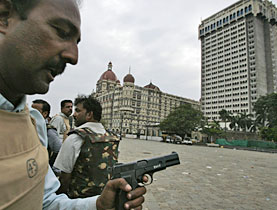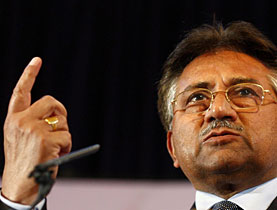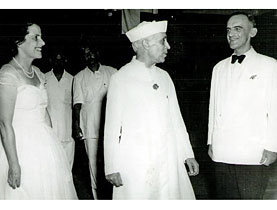Mumbai violence seen as a sign of inner turmoil

The wave of violent attacks across Mumbai are not new to India and can be traced to the country's internal dynamics, Swiss experts say.
However the attackers are sending a different message this week by targeting foreigners for the first time.
There had been ten coordinated attacks since Wednesday. Hotels were under siege, Westerners taken hostage and killed and the central train station turned into a scene of carnage.
The attackers have not precisely spelled out the reasons and aims for the assault.
Faced with this explosion of terror, some Indian and international media have dubbed the events “India’s September 11”. But there is no sign yet that the consequences of these events will be comparable to those that followed the 2001 attacks in New York and Washington.
One reason is that these are not the first such attacks on Mumbai, says Gilbert Etienne, an honorary professor specialising in South Asia at the Geneva Institute of Graduate International Studies.
“The new elements are the targets and quasi-military attacks. But these attacks are part of an ongoing trend in recent years towards acts of terrorism,” he said.
Nor is the scale of the attacks new to the country, says Jacques Baud, the author of several books on the subject of terrorism.
“For several years Mumbai has suffered much more sophisticated attacks than anywhere else in India. Unfortunately this highly developed region has also created terrorists with better strategic capabilities,” he told swissinfo.
Blame
Al-Qaida has been touted as the source of the attacks, as is the case every time there is coordinated terrorist action, however commentators say an “Indianization” of Islamist terrorism also exists in the peninsula.
“There’s probably a bit of both,” said Etienne, who was in Mumbai 24 hours before the attacks first happened.
“There is a certain vagueness about the links between the various Islamic terrorist groups in the world and al-Qaida. These groups are becoming more and more hard line. They seek to destabilize governments, without really having any plans of action.”
But in this week’s attacks Westerners have been taken hostage for the first time in India, with the attackers particularly targeting British and American nationals in hotels.
“This shows that the terrorists want to make a link between Afghanistan and Pakistan, countries increasingly destabilized by American strategy in the region,” argued Baud.
Common front
The attacks have raised new tension between India and Pakistan. India’s government blamed “elements” from Pakistan for the assault. Pakistan said the two countries faced a common enemy and said it would send its intelligence chief, General Ahmed Shuja Pasha, to assist in the investigation of the attacks.
For Baud, the Indian government knows full well that Pakistan is plagued by Islamist terrorism.
“It has no interest in further destabilising Islamabad. This could only encourage Pakistani Islamist movements.”
Etienne said that in this case observers must make a distinction between Indo-Pakistan relations, which are nearing a rapprochement, and internal events in India.
“I spoke recently with senior Indian officials and the idea of a common front against Indo-Pakistani Islamic extremists and the Taliban is making progress,” he explains.
Internal tensions
Etienne argues the cause of this week’s attacks lie elsewhere.
“The attacks on Mumbai first follow an internal dynamic within India. Tensions between Hindus and Muslims have greatly increased since the destruction of the Babri mosque in Ayodhya in 1992 by Hindu militants.”
During the 1990s Muslims were the victims of several massacres, such as in Mumbai in 1993. The killings culminated in the state of Gujarat in 2002.
“Two thousand Muslims were massacred with the complicity of the authorities of that state, even though that government is regarded as one of the best in the federation,” said Etienne.
Hindu terrorism has been on the increase, he added.
“This year, they carried out an attack on a mosque which led to the arrest of a lieutenant-colonel of the Indian army who had been involved in the attack. That’s unheard of.”
Like elsewhere in the world, India is being confronted with the phenomena of fundamentalism and an assertion of identity that can lead to violent action.
“When arriving in Mumbai I was struck by the outward signs of religious affiliation worn by Muslims. These public displays of identity are aggravating the Hindus more and more.”
swissinfo, based on an article in French by Frédéric Burnand in Geneva
Police say at least 195 people have been killed and nearly 300 injured after gunmen attacked 10 sites across India’s financial capital starting Wednesday night.
A small army of young men armed with rifles and grenades, some of whom arrived by sea, spread out across Mumbai to attack sites popular with tourists and business executives. The attackers have not precisely spelled out the reasons and aims for the assault.
On Friday commandos stormed a Jewish centre and a luxury hotel in Mumbai on Friday to retake them. Troops slid down ropes from helicopters to breach the Jewish centre, killing two gunmen but failing to save the lives of five hostages, including a New York-based rabbi and his wife. The commandos also cleared the Trident-Oberoi Hotel and freed 143 hostages, including foreign tourists and businessmen. But at least one gunman was still holed up in the Taj Mahal Hotel on Friday night.
At least 22 foreigners, including citizens from the United States, Israel, Germany, Australia, Britain, Italy, Japan, Mauritius, Singapore and Thailand, were among the dead.
The city has been the target of militant attacks before, including bomb blasts in 1993 that killed at least 260 people at the stock exchange and other landmarks. Two years ago, more than 180 people died when Islamist militants bombed commuter trains.
The attacks have raised new tension between India and Pakistan. India’s government blamed “elements” from Pakistan for the assault. Pakistan said the two countries faced a common enemy and said it would send its intelligence chief to assist in investigations.
Although 30 Swiss national were in places under attack in Mumbai on Wednesday evening, all are now free and unharmed, the foreign ministry said on Friday. They are being assisted by the Swiss consulate in Mumbai and offered support for passports, money and airline tickets if needed.
Six of the Swiss were believed to have been staying at the Taj Mahal Hotel, one of the buildings targeted by militants.
Gilles Andrier, CEO of Geneva group Givaudan was dining in the restaurant of the Trident-Oberoi, one of the luxury hotels affected but managed to escape before the terrorists took hold of the building.

In compliance with the JTI standards
More: SWI swissinfo.ch certified by the Journalism Trust Initiative



You can find an overview of ongoing debates with our journalists here. Please join us!
If you want to start a conversation about a topic raised in this article or want to report factual errors, email us at english@swissinfo.ch.